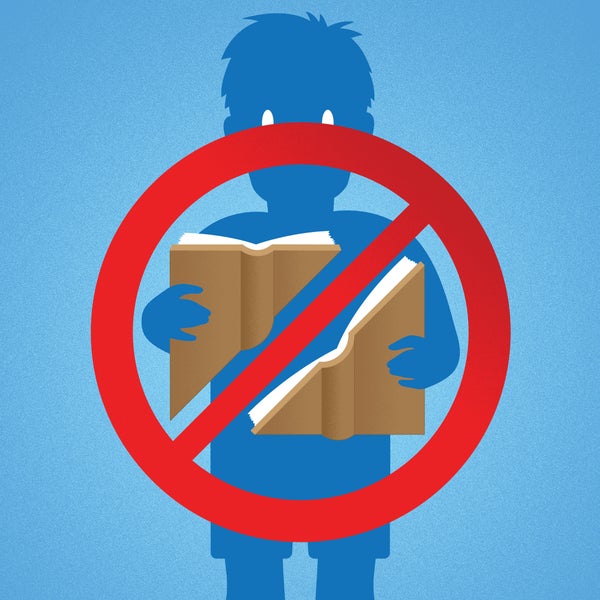November 19, 2024
4 min read
Book Bans Harm Kids
Censoring what children read deprives them of reality and the chance to feed their curiosity and develop empathy

Books are a gift, opening a door to the wide world. But not if you live in one of the U.S. communities where local school boards or state officials have cast certain books as scary monsters that harm children with words and ideas.
Organized conservative groups in many communities are censoring books from school and public libraries, claiming that some themes aren’t age-appropriate for children, never mind the context. They target books on health, climate change, psychology, and other science they find distasteful or antithetical to their way of thinking. They try to criminalize teachers and librarians who dare to give kids a chance to indulge their curiosity. Under the guise of protecting children from harm, they vow to defund public libraries and alter school curricula.
In 2023 the American Library Association documented more than 1,200 cases of efforts to ban library books.
On supporting science journalism
If you’re enjoying this article, consider supporting our award-winning journalism by subscribing. By purchasing a subscription you are helping to ensure the future of impactful stories about the discoveries and ideas shaping our world today.
But it’s the book bans themselves that cause the most harm, robbing youngsters of opportunities to think critically, explore ideas and learn about experiences different from their own. The people responsible for moving books from classrooms and library shelves are trying to limit the flow of information. Their efforts aim to undermine democracy; they would create an electorate of young people who will not question authority, build alliances with people who have less political power, or challenge the status quo. Knowledge is power. Book bans go against the very nature of an open, civil society. Whether through the legal system, the ballot box or our voices, we must uphold educational freedom and support knowledge. We must stop the censoring of books.
Censorship has a shameful history in the U.S. The infamous 1873 Comstock Act made it illegal to mail works considered to be obscene, such as pamphlets about birth control. James Joyce’s Ulysses was banned in the country in the 1920s, and the U.S. Postal Service burned copies. More recently, conservatives have bowdlerized the history and science children learn in schools, altering depictions of slavery, rejecting textbooks that reference climate change and challenging evolution.
In 2023 the American Library Association documented more than 1,200 cases of efforts to ban library books. Petitioners targeted more than 4,200 books for removal from schools and libraries. The most contested books of 2023 include classics such as Toni Morrison’s The Bluest Eye, modern novels and graphic novels about growing up LGBTQ+, a book about teen health, and another about human trafficking. PEN America, a nonprofit that advocates for free expression in literature, noted more than 3,300 efforts to ban books in schools during the 2022–2023 academic year. In some places, books on cancel alert have included works by Judy Blume and Margaret Atwood and, in one case, a book about body positivity aimed at preschoolers.
Why is it so scary to just let kids read?
Education researchers Gay Ivey of the University of North Carolina at Greensboro and Peter Johnston of the University at Albany studied four classrooms where teachers let teens choose what they wanted to read from a long list of books. The students’ reading scores improved, they say, but teachers saw even more positive outcomes. The students talked to one another about themes in the books they read, developed compassion and empathy for the characters and their struggles, and thought about choices and consequences. In addition, their mental health improved.
In one survey, nearly 40 percent of children, especially those from underrepresented ethnic backgrounds, said reading about characters they could identify with boosted their confidence. Yet nearly half of children ages eight to 11 said they had trouble finding such books.
In some states, book-banning efforts are nestled into other bills with seemingly virtuous goals. In Missouri, for example, Senate Bill 775, enacted in 2022, looks to protect children from sexual abuse and trafficking, but embedded within the law is a passage that criminalizes teachers and librarians for giving students “explicit sexual material,” with wording so broad that it could include books on health or sex education.
Rebecca Wanzo, a professor at Washington University in St. Louis who studies graphic novels, which are some of the most frequently banned books, says denying children and teens access to the panoply of ideas in books creates people who “don’t know what they don’t know.” She says some students who take her classes are shocked by the alternative explanations her lectures and reading lists provide for different aspects of human existence.
So where does this leave us?
Some teachers are keeping canceled books in secret drawers. Some schools in more open districts are introducing the idea of reading clubs focusing on banned books. Librarians are questioning what they are allowed to put on shelves instead of promoting what’s there. Parents who want their kids to have a thorough education are trying to fight back against well-funded and politically motivated advocates of book bans.
The kids who can are speaking up for books and libraries. It is up to us to help them, as well as the ones who can’t. Book bans are antithetical to free speech and free thought. They are antidemocratic, antiscience and antievidence. Reading this editorial with no one looking over your shoulder is your fundamental right. Our children deserve the same.








&w=100&resize=100,75&ssl=1)
